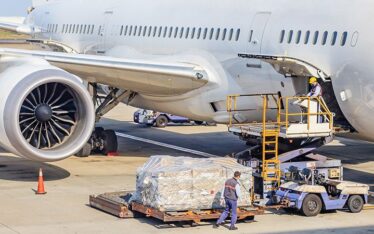International air freight cost is made up of multiple variables. In addition to the costs associated with domestic air freight shipping, there are also costs for customs and other special handling concerns. With international air freight, there are fees from both the origin country and the destination country which can complicate the final charges. Often, there will be various taxes and duties associated with importing and exporting certain goods like alcohol, some foods, tobacco products, and more.
Here we will look at some of the factors that affect international air freight cost, when ocean shipping may be a preferred method of transportation, and how Ontario Container Transport can assist with your international shipping.
How is International Air Freight Cost Calculated?
International air freight cost has the same basic components as when items are flown within their home country. Factors that are considered when shipping by air include:
Chargeable Weight: This is the weight of your shipment and it can refer to either the actual weight or the dimensional weight depending on which is higher. Dimensional weight is a weight calculated based on how much space your shipment takes up vs the actual weight. This is used when an item takes up significant space even though it is light. For example, a shipment of bags of potato chips may not be that heavy but the bags cannot be crushed flat. Space must be left so the chips can arrive undamaged which increases the shipment’s volume.
Customs: Depending on where you are shipping from and to, customs fees can be significant. Fees associated with customs are the main cost that sets international air freight charges apart from domestic freight charges.
Fuel: Fuel is a major factor in all shipping but especially in the long distances associated with international shipping.
Shipping Insurance: Though it is not required to have insurance, it can really save the day when the unexpected happens. Depending on the value and rarity of the items you are shipping, you may consider additional insurance to cover greater losses.
Documentation: Items in a shipment must be well documented before being sent out. By accurately describing the items in your shipment, you will be better able to report losses since there will be a detailed reference to go by. Additionally, properly documenting your shipment reduces the likelihood that your items will require extensive inspection by the airline which can incur significant charges. Documentation fees include the fee paid to the customs broker, an expert in filling out the necessary paperwork.
Other Charges: Other charges associated with international freight charges include:
- Taxes
- Misc charges for delivery
- Cargo handling fees
- Storage
- Special handling fees for hazardous or perishable items

International Air Freight Vs Ocean Freight
Shipping via boat has been a reliable way to transport items internationally for centuries. To this day it continues to be a popular mode of shipping transportation. However, it does have issues that can be solved with air freight. Let’s look at the differences between these two modes of transportation and when to use each.
Speed: There is absolutely no contest when it comes to speed. Airfreight shipping can be accomplished in a fraction of the time that ocean shipping can be. For example, shipping from China to Canada can take well over a month while air shipping can be accomplished in as little as three days.
Cost: Just as air freight shipping is the clear winner when it comes to speed, shipping via ocean is decidedly less expensive. However, though freight shipping is often at least four times more expensive than boat shipping (and often much higher than that), it can often help you serve more customers faster. However, if there is no rush on your shipment, shipping by sea is decidedly more cost-effective.
Specialty Items
- When Shipping Perishable Items: While some perishable items may be kept on a temperature-controlled ship, the long journey is not ideal. With ocean travel taking weeks longer, there is more risk that items may not be successfully kept at a proper temperature. Also, clearly, many items cannot even last as long as an ocean shipment would take no matter the temperature control.
- Hazardous Items: Hazardous items can include anything from certain chemicals and lithium batteries to less expected items like hand sanitizer that contains alcohol. Depending on the exact material, either air or ocean freight may be better. Typically, restrictions are much more strict on air freight which makes ocean freight shipping preferable.
- Fragile Items: Fragile items can be shipped via air or water with success. In each shipping method, extra care is taken to ensure the safe arrival of your items, however; air freight may have an advantage simply because it is faster. A shorter shipping time means less time for potential damage to occur.
Reliability: Being able to ship items reliably is extremely important to many businesses. While both air and ocean shipping can be reliable, air freight shipping is less vulnerable to delays. Though things like poor weather can affect both types of transportation, air freight carriers are able to pivot much more easily than ocean carriers.
Going Green: While air freight shipping has many advantages, it is not the most environmentally friendly form of shipping. Ocean shipping can be accomplished with a fraction of the CO2 emissions of air freight shipping. For companies looking to reduce their carbon footprint, ocean shipping should be chosen over air freight shipping as often as possible.
Express International Air Freight Shipping
Express or expedited air freight shipping is the fastest way to send your shipments internationally. With OCT’s established network of carriers, we are able to offer some of the fastest shipping options on even the longest distances.
Intermodal Shipping
Sometimes the best mode of shipping is actually multiple modes. We offer shipping by train, truck, and ocean along with air freight. With OCT’s intermodal shipping options we can balance cost savings, speed, and convenience to meet your scheduling and budget needs.
We use intermodal shipping containers designed to withstand the needs of multiple modes of transportation. Depending on the items in your shipment, we offer both refrigerated shipping containers and ventilated containers to protect items that require airflow.
Refrigerated Intermodal Containers: equipped with three separate temperature-controlled areas, our reefer containers allow you to ship items at different temperatures all in the same unit.
Ventilated Containers: While some items are best protected by being completely sealed, others require ventilation to ensure there is not a build-up of moisture. Our ventilated containers are ideal for perishable items like fruits and vegetables that are affected by humidity.
Get a Free International Air Freight Quote
Whether you need to get your items to their destination as fast as possible, reduce your carbon footprint, or get the best rates on international shipping, Ontario Container Transport is here to help. Our dedicated team and established network of intermodal carriers offer you reliable, efficient, and secure shipping options nearly anywhere in the world.
Call the OCT team at 905-695-1501 to request a free quote on your next international air freight shipment.




